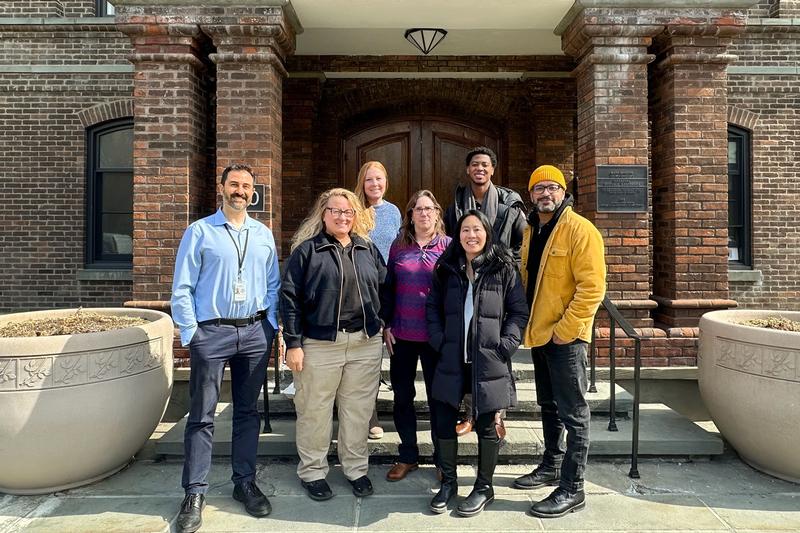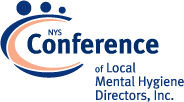NYS Conference of Local Mental Hygiene Directors, Inc. | An Affiliate of the New York State Association of Counties >
Hot Topics / Priority Issues
CLMHD Expands Mental Health First Aid Pilot to More Colleges After Successful First Year
CLMHD Expands Mental Health First Aid Pilot to More Colleges After Successful First Year
Albany, NY – The New York State Conference of Local Mental Hygiene Directors (the Conference), in partnership with the New York State Office of Mental Health (OMH) and the Office of Addiction Services and Supports (OASAS), is proud to launch the second year of the Mental Health First Aid (MHFA)/Harm Reduction in Higher Education Project. Building on over a decade of OMH-funded efforts to expand MHFA training statewide, the initiative is designed to foster healthier, more resilient college environments—supported by harm reduction resources from OASAS.
Developed by the National Council for Mental Wellbeing, MHFA is an evidence-based training program that teaches individuals how to recognize, understand, and respond to signs of mental health and substance use challenges. This training provides the skills necessary to offer initial support until professional help is available.
The Conference is grateful to OMH for its continued investment in Year 2, which makes it possible to expand the project’s reach and equip additional campuses with the tools needed to create responsive, supportive, and healthy learning environments.
Office of Mental Health Commissioner Dr. Ann Sullivan said, “Mental Health First Aid provides invaluable strategies that can help individuals in a behavioral health crisis. The pilot program established through a partnership with OASAS, the Conference of Local Mental Hygiene Directors, and the county Directors of Community Services will bring this critical training to five colleges and equip students, faculty, and staff with the tools they can rely on to help individuals with mental health and substance use issues. We look forward to working with these institutions to integrate this training into campus life.”
During its first year, this initiative certified 30 faculty and staff members from five colleges as MHFA instructors. The participating colleges included:
- Monroe Community College (Monroe County)
- SUNY Cobleskill (Schoharie County)
- SUNY Orange (Orange County)
- Vassar College (Dutchess County)
- York College/CUNY (NYC)
Each institution established a dedicated instructor team to deliver at least three MHFA trainings in the year following certification, with a maximum capacity of 30 participants per session, positioning the program to reach up to 2,700 individuals by October 2025.
A key to the project’s success has been uniting state agencies, the county Directors of Community Services (DCSs), and college administrators to develop a coordinated approach for delivering these critical supports. As local behavioral health authorities, DCSs helped identify colleges in need of these programs and ensure alignment with county service planning.
“The Conference is proud to work alongside its State partners at OMH and OASAS to initiate the second year of this valuable project supporting a new cohort of colleges with MHFA training and harm reduction resources to benefit the overall well-being of the students. The DCSs are instrumental to the success of this project by connecting colleges with the resources needed to expand mental health awareness, training opportunities, and access to local supports,” said Courtney David, CLMHD Executive Director. “Their involvement ensures this initiative is grounded in local priorities while fostering strong, sustainable community-based partnerships.”
To supplement this project, the Conference and OASAS are working closely with participating colleges to explore harm reduction strategies tailored to each campus's unique needs—underscoring New York’s commitment to the integration of care in higher education.
OASAS Commissioner Dr. Chinazo Cunningham said, “College students are considered an at-risk population for substance use, and this innovative program is helping NYS OASAS reach more of them with important information on accessing harm reduction supplies, including naloxone and test strips, as well as additional resources and educational materials. Through this ongoing collaboration with our partners in this effort, we are helping to keep New York students safe and look forward to providing continued support as this program expands to additional locations.”
"Mental Health First Aid training in Dutchess County is crucial in building a community where everyone is empowered to recognize, understand, and respond to mental health crises. By equipping individuals with the knowledge and skills to offer immediate support, we are fostering a compassionate environment that ensures no one faces a mental health challenge alone," said Jean-Marie Niebuhr, LCSW-R, Commissioner of the Dutchess County Department of Mental Health.
“SUNY Cobleskill has been a great collaborator with the Office of Community Services through the years. We were quick to jump on this MHFA pilot for them and this community. It was a chance to expand access to the crisis system here while making more people aware of mental health and substance use services within the community. The MHFA pilot offered us a chance to expand both of our plans around a healthier community while creating a group of paraprofessionals on and off the campus who can assist those experiencing a mental health or substance use problem and get them the help they may need hopefully before it becomes an emergency,” said Sarah Nies, LMHC, Director of the Schoharie County Office of Community Services.
Campus leaders shared how the pilot has already made a lasting impact on training, collaboration, and student engagement:
“I am so grateful that MCC was selected to participate in this pilot program and would highly recommend that others take advantage of this incredible opportunity. While the MCC MHFA trainers have organized trainings to educate and inform our campus community members; I have also had the privilege to observe our MHFA trainers collaborate in ways that would not have occurred without being a part of this project, all while focusing on the importance of Mental Health First Aid. I am proud of this program and of all the efforts put forth by my MCC colleagues,” said Aubrey Zamiara, Director of Counseling, Disability, Health & Wellness, at Monroe Community College.
"We saw Mental Health First Aid as a great fit for our campus and worked to integrate it into existing training programs. Our Residential Life team agreed to replace multiple trainings with this one, ensuring all our RAs receive Mental Health First Aid certification. This guarantees a built-in audience of 60+ students, making it a strong starting point. Having this structured integration makes the rollout much easier and more sustainable,” said Lynn Ontl, Director of the Wellness Center, at SUNY Cobleskill.
The MHFA Higher Ed/Harm Reduction Project has laid a strong foundation for expanding mental health awareness and training across college campuses. Insights from the project will help to inform the next phase of expansion, and an emphasis will be placed on refining training logistics, enhancing the collection and reporting of data, deepening institutional engagement, and prioritizing long-term sustainability. The goal is to provide a scalable, statewide model that serves as a strong foundation for enhancing the mental well-being of students across New York’s higher educational settings.

Staff from Vassar College participating in the Mental Health First Aid pilot, alongside a representative from the Dutchess County Department of Mental Health. Photo courtesy of Nicole Adamo



